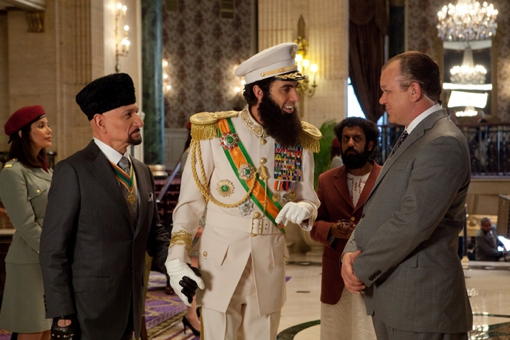By Jim Rohner · May 19, 2012

Anyone aspiring to be a fascist dictator first needs to make sure that they're completely insane. Saddam Hussein, Muammar Gaddafi, Idi Amin and many other superstars of human oppression all zealously stockpiled crazy and swam around in it in Scrooge McDuck-like fashion. Because these and other tyrants were too busy committing genocide on their own people, there was never really ample opportunity to see what hijinks would ensue if these leaders were rendered physically unrecognizable to wade through the streets of New York City where he would come in regular contact with those he hated so much.
Sacha Baron Cohen has attempted to illustrate such hijinks with The Dictator, a film in the vein of Ali G Indahouse in that his fictional character is only making the lives of other fictional characters uncomfortable. The fictional character in this sense is Admiral General Aladeen, the self-obsessed leader of the fictional north African country of Wadiya. Aladeen is a curious mixture of lonely, self-conscious, and sociopathic, subjecting his oppressed countrymen to life in a barren desert while he lives it up in the lap of luxury, executing anyone who defies him, which can include something as simple as questioning his poor recollections of past executions. It's the kind of humorous slant on blatant oppression that we've seen in the likes of The Great Dictator before, but with a lot more body hair.
Well, Aladeen loses a significant chunk of that body hair – his defining beard – at the hands of a private security officer who's been hired by Aladeen's Uncle Tamir (Ben Kingsley) to get rid of the dictator before he's to give a speech at the U.N. The shaving, though a botched attempt at torture, still renders Aladeen unrecognizable and with him out of the way and replaced by a lookalike, Tamir can accept the constitution the U.N. is demanding Wadiya sign. In turn, the country's borders will be open to capitalism and specifically, to wealthy oil tycoons who wish to be the first to tap into the nation's underground reserve.
So the despot is left to wander the streets of New York City alone with no means of infiltrating the U.N. and striking down the dreaded constitution that will free his people from his tyrannical reign. Is there no justice for those whose sole wish in life is to rule with an iron fist? Luckily for Aladeen (and political satire), he comes in contact with two unlikely allies: the liberal protestor, Zoey (Anna Faris), an agglomeration of every agenda with which the left has become synonymous; and Nadal (Jason Mantzoukas), Aladeen's former head of WMD development who should have been executed years ago. Hijinks thusly ensue.
Cohen has made a name for himself irritating America's political and social conservatism through his fish out of water characters and The Dictator, though still conceptually in line with past titles like Borat and Bruno, is actually hindered by its narrative obligations. With Borat and Bruno (less so with the latter), the pleasure was derived from the people's reactions that would bring to light and subsequently comment on biases and assumptions that are inherent within people. In those films, Cohen was like a perpetual motion machine, improvising off peoples' inability to comprehend his character, coaxing more and more hilarious inappropriateness out of them. There was really no need for a narrative to build towards a capstone on the nose moment because every single awkward moment was indicative of whatever that moment would've represented anyway.
But The Dictator tries to have its cake and eat it too by trying to feed off of awkward moments in the process of building towards its most satirical closing few minutes. We all know from viewing fish out of water films in the past that Aladeen is going to go through his character arc, he's going to ingratiate himself into his foreign surrounding and to a degree, that foreign surrounding is going to ingratiate itself to him. And yet, even at a brisk 83 minutes, The Dictator seems to dedicate only a small fraction of screen time to the advancement of its plot, favoring instead to let scenes linger for the sake of expounding on interactions where comedians like Cohen and Mantzoukas are clearly just bouncing gags off each other back and forth.
I can't prove this beyond a shadow of a doubt – the film does credit 3 screenwriters, after all – but the heavy improvisational nature of the cast involved combined with the fact that scenes are chopped up at an erratic rate seem to imply that excessive editing was required to cut and tape the funniest bits together in a way that would make sense. It's easier to forgive because some of these moments are tremendously funny – practically every moment in Zoey's organic food store is hilarious, particularly his abuse of the customers – but there's a lot of comedic meandering as well.
Everything is wrapped up neatly and appropriately in the end (as appropriate as the end of the story about a fascist dictator can be) and there will certainly be plenty laughs along the way to the "oh, by the way we had something to say" conclusion, but without the genuine shock of real people or the time dedicated to biting political satire, The Dictator becomes one of those comedies you'll forget you've seen.